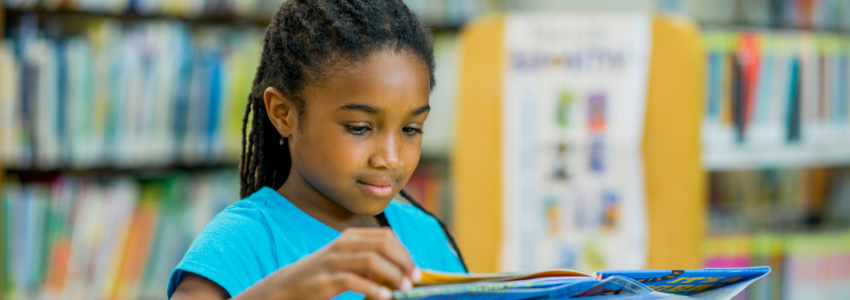

BLOGS > NOVEMBER 9, 2023
BY LAURA BYARS

What is the science of reading?
As teachers and young students settle into the school year, the science of reading takes center stage in many classrooms. In addition to teaching reading comprehension, vocabulary, and fluency, many early elementary teachers will restructure the literacy block to allocate more time for phonics-learning. Lesson planning may stem from new reading programs with strong phonics components. Sound walls displaying unique vowel and consonant sounds may adorn classroom walls where word walls once hung. Decodable texts may line classroom shelves once occupied by leveled readers.
The science of reading is a body of research incorporating knowledge from various disciplines – including developmental psychology, educational psychology, and cognitive science – about how we learn to read. One underlying principle in the science of reading is the importance of explicit and systematic phonics instruction.
At the simplest level, phonics instruction encompasses several critical pre-reading skills:
The science of reading asserts that the ability to decode print language – without reliance on picture cues – is critical to foundational literacy. If students aren’t explicitly taught a progression of decoding skills that increase in complexity, they will struggle to read on grade level with proficiency.
Why is the science of reading trending in practice?
Several factors have contributed to an increasing emphasis on the science of reading in recent years. Reporting in PreK-12 educational news outlets highlighted decades of low reading scores on tests such as the National Assessment of Educational Progress (NAEP). Reports pointed to strategies used in popular balanced literacy programs, which can run counter to the science of reading, as partly to blame.
Beginning in 2013, Mississippi spent years overhauling its approach to teacher training and teaching reading under the Literacy-Based Promotion Act. NAEP ranked the state number one in the nation for gains in fourth grade reading from 2017 to 2019, and fourth in eighth grade reading. In 2019, as the scores across the nation stagnated, Mississippi’s rose.
Learning loss brought on by the pandemic further magnified the need for quality reading instruction. The 2022 NAEP assessment reported average reading scores for Grade 4 fell from 2019 to 2022 by five points – the biggest decline since 1990. Scores fell for White, Black, and Hispanic students, and for every region in the United States except the West. Not surprisingly, students who were struggling before the pandemic saw the greatest drops. Researchers point to the impact of the pandemic on access to supports such as devices, the internet, a quiet place to work, and help from teachers.
Many states are now replicating the “Mississippi model” which is based on principles in the science of reading. As of July 21, 2023,32 states and the District of Columbia have passed laws or implemented new policies mandating evidence-based reading instruction, a nod to the science of reading. Most came into effect in 2021 (Schwartz).
New practices call for different solutions.
If the science of reading is something your school community is considering, you need resources to teach foundational literacy skills that are different from what was needed under balanced literacy models.
The good news is that many Follett publisher partners are responding to the need for explicit and systematic phonics instruction. Follett can provide resources to support principles highlighted in the science of reading. Even better news is that these supplemental resources can be used with core programs already in place!
To learn more about these resources, visit Titlewave®.

Laura Byars
Manager, Curricular Alignment
As Manager, Curricular Alignment, Laura leads teams that create, curate, and align content to PreK-12 educational needs. Before coming to Follett, she taught language arts, science, and a summer reading intervention program in a high-performing school district in the western Chicago suburbs. She has master’s degrees in Teaching and Reading & Literacy. Laura has a passion for literacy learning. When she’s not working, you can find her reading picture books to her grandson or enjoying an outdoor activity with her husband.
An Author Interview with Drew Daywalt
June 27, 2025
Drew Daywalt, award-winning author of the best-selling The Day the Crayons Quit series, is about to release his second middle grade book with illustrator Mike Lowery, No Sam! and the Meow of Deception. The title continues the hilarious adventures of Sam...
Read more
An Author Interview with Adam Wallenta and Makana Wallenta
June 27, 2025
Get ready to rock the galaxy with the first volume of Punk Taco – a wildly imaginative, music-fueled sci-fi adventure from father-son duo Adam and Makana Wallenta. Created when Makana was just five years old, this award-winning graphic novel now debuts...
Read more
An Author Interview with Lisa Manuzak Wiley
June 27, 2025
A bewitching new graphic novel series is arriving this fall!Author-illustrator Lisa Manuzak Wiley, who grew up in Hawaii, blends cozy fantasy, sisterhood, and tropical charm in a heartfelt homage to her roots: The Witches of Pepperwood Bay Vol. 1. Lisa...
Read more
What We're Reading – Books to Add to Your TBR List
June 4, 2025
As a Follett Content Outside Sales Consultant, I’m not only an avid reader, but also a passionate book reviewer! I’ve curated my top 10 book picks that are perfect for adding to your To Be Read (TBR) list. These titles...
Read more
Author Joseph Koszary on the Changes Made to the International Baccalaureate Extended Essay
May 22, 2025
As someone who’s served as an extended essay coordinator, examiner, and supervisor, I’ve grown deeply familiar with the previous incarnation of the extended essay (EE). Like many of you, years of accumulated experience have made supporting students through the process...
Read more
Celebrate Literacy All Year Long: Host an Online Book eFair!
May 12, 2025
Reading and literacy are essential parts of our lives, and there are numerous events throughout the year dedicated to celebrating and promoting these important skills. Hosting a Follett Book eFair is a fantastic way to engage your school community, share the...
Read more